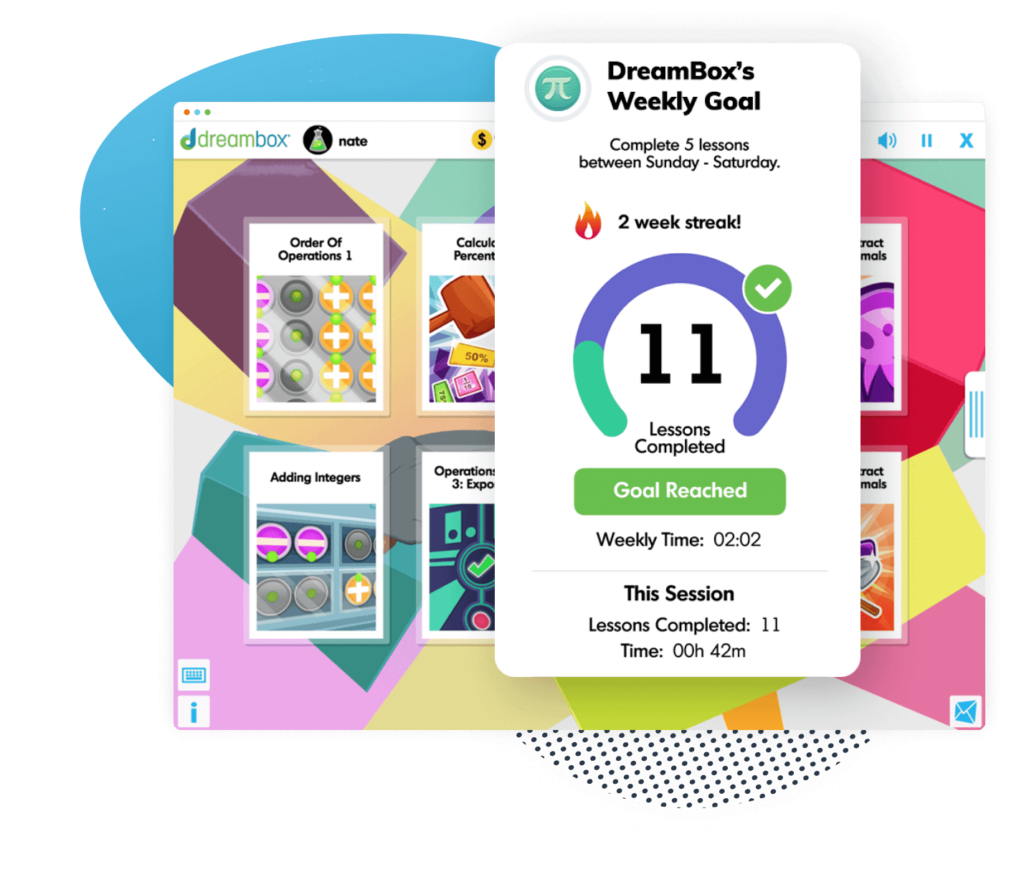How to Convert Units of Time
Discover the power of multiplication and its fundamental properties, making multiplication operations easier to understand and solve.

Author
Tess Loucka
Published:
Oct 2024
Key takeaways
- • Units of time are the numerical values we use to measure time.
- • When converting a larger unit of time to a smaller unit, multiply. When converting a smaller unit to a larger unit, divide.
- • Months are standardized to all have 30 days in time-conversion problems.
Have you ever wondered how old you are? I mean, how old you are really? How many weeks, days, hours, minutes, and seconds, how much time has passed since you were born?
Knowing how to convert units of time is essential for answering questions like how old you are down to the day. It also comes in handy when marking your calendar for a date in the future or simply reading a clock to tell the time.
Converting units of time is one math topic that you’ll use every day throughout your life! So, what exactly is a unit of time anyway?
Understanding Units of Time
A unit of time a numerical value we use to measure time. Units of time include seconds, minutes, hours, days, weeks, months, and years.
When thinking about how many seconds in a minute, or how many seconds in an hour, what you’re really thinking about are time unit conversions.
Before we get into unit conversion, let’s go over the values of each unit of time.
- 1 minute = 60 seconds
- 1 hour = 60 minutes
- 1 day = 24 hours
- 1 week = 7 days
- 1 month = 30 days
- 1 year = 12 months
- 1 year = 365 days
You may be wondering why we say one month is equal to 30 days when we know that’s not always true. For the purpose of standardization, months are said to be 30 days long when calculating time conversion.
Additionally, even though some years are leap years that contain one additional day, we always treat one year as equal to 365 days during time unit conversions.
Table of contents
Unlock your child's full potential with DreamBox Math!
Turn math into playtime with DreamBox Math
DREAMBOX MATH
Get started for FREE today!

How to Convert Units of Time
A general rule of thumb for time conversion is to multiply when converting a larger unit to a smaller unit and divide when converting a smaller unit to a larger unit.
For instance, to convert 1 hour into minutes, you’d multiply by 60 because there are 60 minutes in an hour. For example, if we want to know how many minutes are in 3 hours, we’d follow this formula:
3 x 60 = 120 minutes
On the contrary, to convert minutes into hours, you’d divide the amount of minutes by 60.
Try this!
How many hours are in 420 minutes?
To solve this problem, all we need to do is divide 420 by 60.
420 / 60 = 7
So there are 7 hours in 420 minutes.
Another thing to remember is that time on a clock always revolves around the number 60. There are 60 seconds and 60 minutes on a clock face, so when we convert seconds to minutes or minutes to hours, we’ll use the number 60 quite a bit.
Converting Seconds to Minutes
To convert seconds to minutes, remember two key things:
- There are 60 seconds in 1 minute. Always use the number 60 when converting seconds to minutes.
- We are going from a smaller unit of time to a larger unit of time; therefore, we divide!
Ex. Convert 100 seconds to minutes. Divide 100 by 60. Sixty goes into 100 one time. The remainder is 40. So, 100 seconds is equal to 1 minute and 40 seconds.

Converting Minutes to Seconds
To convert seconds to minutes, remember two key things:
- There are 60 seconds in 1 minute. Always use the number 60 when converting seconds to minutes.
- We are going from a smaller unit of time to a larger unit of time; therefore, we divide!
Ex. Convert 100 seconds to minutes. Divide 100 by 60. Sixty goes into 100 one time. The remainder is 40. So, 100 seconds is equal to 1 minute and 40 seconds.
Converting Minutes to Hours
Two tips to remember:
- 60 minutes = 1 hour
- We are going from a smaller unit of time to a larger unit of time, so we have to divide!
Ex. Convert 240 minutes to hours. Divide 240 by 60 to get 4. That means 4 hours equals 240 minutes.
Converting Hours to Minutes
Two tips to remember:
- 1 hour = 60 minutes
- We are going from a larger unit of time to a smaller unit of time, so multiply!

Ex. Convert two and a half hours to minutes. Multiply 2 by 60 to get 120. Add 30 minutes. 120+30=150. There are 150 minutes in two and a half hours.
Converting Hours to Days
Two tips to remember:
- 24 hours = 1 day
- We are going from a smaller unit of time to a larger unit of time, so we have to divide!

Ex. Convert 28 hours to days. Divide 28 by 24. Twenty-four goes into 28 one time. The remainder is 4. So, there is 1 day and 4 hours in 28 hours.
Converting Days to Hours
Two tips to remember:
- 1 day = 24 hours
- We are going from a larger unit of time to a smaller unit of time, so multiply!
Ex. Convert 7 days to hours. Multiply 7 by 24 to get 168. That means 168 hours equals 7 days.
Converting Days to Weeks
Two tips to remember:
- 7 days = 1 week
- We are going from a smaller unit of time to a larger unit of time, so we have to divide!
Ex. Convert 35 days to weeks. Thirty-five divided by 7 is 5. That means 5 weeks equals 35 days.
Converting Weeks to Days
Two tips to remember:
- 1 week = 7 days
- We are going from a larger unit of time to a smaller unit of time, so multiply!
Ex. Convert 2 weeks and 3 days into days. Two multiplied by 7 is 14. Add 3 to get 17. There are 17 days in 2 weeks and 3 days.
Converting Weeks to Months
Two tips to remember:
- 4 weeks = 1 month
- We are going from a smaller unit of time to a larger unit of time, so we have to divide!
Ex. Convert 6 weeks to months. Six divided by 4 is 1 with a remainder of 2. So, there is 1 month and 2 weeks in 6 weeks.
Converting Months to Weeks
Two tips to remember:
- 1 month = 4 weeks
- We are going from a larger unit of time to a smaller unit of time, so multiply!
Ex. Convert 8 months to weeks. Eight multiplied by 4 is 32. So, there are 32 weeks in 8 months.
Converting Months to Years
Two tips to remember:
- 12 months = 1 year
- We are going from a smaller unit of time to a larger unit of time, so we have to divide!
Ex. Convert 24 months to years. Twenty-four divided by 12 is 2. That means 2 years equals 24 months.
Converting Years to Months
Two tips to remember:
- 1 year = 12 months
- We are going from a larger unit of time to a smaller unit of time, so multiply!
Ex. Convert 10 years to months. Multiply 10 by 12 to get 120. That means 120 months equals 10 years.

The math program that drives results
Get started today!
DreamBox adapts to your child’s level and learning needs, ensuring they are appropriately challenged and get confidence-building wins.
How to Convert Non-Consecutive Units of Time
By now, we’ve gone over the rules for converting consecutive units of time, like minutes to seconds, or months to years. But what about non-consecutive conversion? How do you convert minutes to months? Or seconds to hours?
To convert non-consecutive units, start with the larger unit and work your way down to the smaller unit. Breaking the problem down into smaller problems helps us!
Let’s try turning one week into seconds:
Start by converting 1 week into hours. Since we are going from a larger unit of time to a smaller unit of time, we multiply:
1 week = 7 days
1 day = 24 hours
Therefore, we multiply 7 x 24 to get 168 hours in one week.
Next, let’s convert 168 hours into minutes. Once again, we are going from large to small so we multiply.
1 hour = 60 minutes
Therefore, we multiply 60 minutes by 168 hours to get 10,080 minutes.
For the last step, convert 10,080 minutes into seconds. You guessed it! We multiply again
1 minute = 60 seconds
Multiply 60 seconds by 10,080 minutes to get 604,800 seconds.
In other words:
7 days x 24 hours = 168 hours
168 hours x 60 minutes = 10,080 minutes
10,080 minutes x 60 seconds = 604,800 seconds
So, there are 604,800 seconds in 1 week. l
Practice Problems
Click on the boxes below to see the answers!
Answer: 10,080
Start with the largest unit of time and work down to the smallest. There are 7 days in one week. Each day, there are 24 hours. In each hour there are 60 minutes. 7x24x60=10,080.
Answer: 8,100
Start with the largest unit of time and work down to the smallest. In 1 hour, there are 60 minutes. That means 2 hours equals 120 minutes. Add 15 minutes to that to get 135 minutes. There are 60 seconds in each minute. 135×60=8,100.
Answer: 436
Start with the largest unit of time and work down to the smallest. In 1 year, there are 365 days. Every month counts as 30 days, so 2 months equals 60 days. 365+60=425. Add 11 days to that to get 436.
FAQs about Converting Time
Seconds, minutes, hours, days, weeks, months, and years.
The zeptosecond. A zeptosecond is a trillionth of a billionth of a second. However, the second is the smallest unit of time we use on a daily basis.
There are 60 minutes in an hour, so to convert hours to minutes, multiply by 60. When converting minutes to hours, you divide.
Take at home math practice to the next level
Empowering parents and educators to make math practice more impactful. Plus, your kids will love it.
